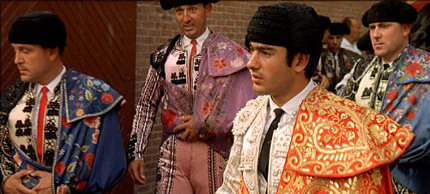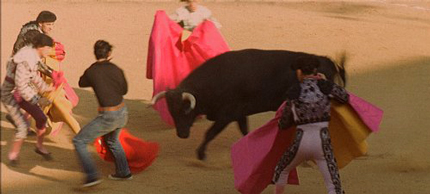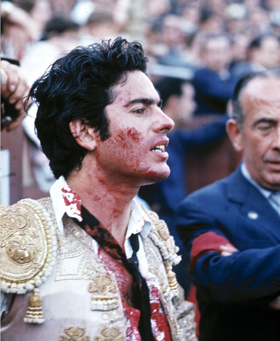
 |
|
|
|
Bullfighting has long been exploited for exotic film stories of romance and betrayal, as in the two American versions of Blood and Sand. With its attendant pomp and circumstance, costumes and rituals, the ornate Spanish tradition lends itself well to stylized melodrama. The prospect of death in the arena instantly points up questions of courage and ambition. American director Budd Boetticher discovered a fascination for bullfighting that became a lifelong passion. His Bullfighter and the Lady with Robert Stack is one of the best unheralded films of the 1950s. When his frequent star Randolph Scott retired, Boetticher spent the better part of a decade filming a documentary about a Mexican matador, Carlos Arruza. 
In 1965 the Italian director Francesco Rosi went to Spain to film The Moment of Truth (Il momento della verità), his own study of bullfighting. A prominent "committed" leftist director, Rosi was best known for a crime movies that exposed deep corruption in entrenched Italian institutions: La Sfida, Salvatore Giuliano, Hands over the City. Peter Matthews tells us that Italian reviewers reprimanded Rosi for taking his talent on a tourist trip to Spain, away from the politics of Southern Italy and Sicily that he knew so well. But Rosi's bullfighting movie is infused with the observances of a keen social critic. The film's semi-documentary style emphasizes the economic imperatives that lead the poor farmer's son Miguelín (Miguel Romero) to the bullring. Young Miguel leaves the farm for the city, and finds that the only way to secure even the most menial day labor is to hand over a portion of his wages to an intermediary. Fed up with sleeping in a communal dormitory, he attaches himself to the aged bullfighting teacher "Pedrucho" (Pedro Basauri) and begs and wheedles his way into the arena. Miguelín has the skill, determination and sheer nerve to succeed, and quickly rises to success. But his manager's fees eat up his earnings, while he pays the overhead for a full entourage. After the thrill of luxury and notoriety wears off, Miguelín begins to question why he's putting himself in such jeopardy, again and again. We remember the words of Miguelín's worn-out father: "Stay home. There's nothing better than bread and wine in your own house." Viewers that wonder what really happens in bullfights when the Hollywood cameras cut away will likely be deeply impressed by the bloody carnage in Rosi's The Moment of Truth. Armed with widescreen Techniscope cameras that capture every detail in full-frame color, the film delivers close-up sensations that even spectators do not see. The bull is flayed and stabbed again and again, and is finally dispatched with a curved sword that pierces its heart and/or lungs. Before these incomparably strong animals collapse, gallons of blood seem to go every which way. In some fights the sleeves of Miguelín's beautiful chaquetilla are soaked in blood. 
Seeing The Moment of Truth makes us wonder how many Spaniards were maimed by these violent encounters. Miguelín participates in a 'running of the bulls' ritual designed to offer young men the opportunity to prove their manliness: in one breathtaking shot a charging bull plows through a crowd, throwing boys and men left and right like a hit and run driver. What makes the action so impressive in Rosi's movie is that practically nothing is faked. A genuine matador plays the role of Miguelín, and everything he does in the bullring is real. A natural actor, the handsome Miguel Romero makes us believe that he's a brash kid willing to take chances to better himself. To get the attention of the promoters, Miguelín dashes into the middle of a bullfight and steals the spotlight to perform some deft passes. The crowd cheers, even when he's forcibly ejected. Miguelín quietly accepts a secondary position behind a pampered young candidate, and seizes his big opportunity when the favored son panics in the arena and refuses to fight. We see enough bullfighting to recognize a sloppy performance, of which there are plenty, especially in local exhibitions. But it's immediately obvious that Miguelín has the Right Stuff: no matter how intimidating the bull, he never loses his graceful stance or sense of control. When the bull is exhausted, he'll drop his cape and stand unarmed before it, touching its head. One really needs to be able to 'read' the bull to do this, and even then the animals are unpredictable. It is just this kind of bravado that makes Miguelín a star. Our hero's arc follows the standard pattern: one day he's just another unskilled kid on the street, and the next he's driving home in a convertible car with red leather upholstery, to have a phone installed in his mother's house so he can call the tiny old lady after every fight. Although he's suddenly the center of attention at parties, no great love enters Miguelín's life. He strikes up a conversation with a sweet girl at the harvest back home. Had he remained a farmer she might have been an attractive prospect. But because he's dressed in his city clothes and driving that car, she no longer seems a match. Substituting for Ava Gardner or Rita Hayworth is star Linda Christian, in the brief role of an American playgirl who sees Miguelín at a party and wastes no time seducing him. "You're not afraid of the bulls," she asks, "But are you afraid of me?" The Moment of Truth's riveting scenes in the arena reach heights of realism unknown in Hollywood filmmaking, with its cheating cutaways and process shots. But we're also acutely aware of Miguelín's emptiness and lack of security. His handlers urge him to take on an accelerated schedule, so as to maximize his earnings while he's young and hot. Yet it is the same as when he was a street laborer -- he takes the risks while others collect the secure paycheck. Director Rosi doesn't harp on this problem, but it is never far from our thoughts. 
Rosi's visual thesis doesn't end with his pointers to the exploitive nature of society. The film is bookended with footage of a religious procession, the kind in which huge golden floats honoring Jesus and the Virgin Mary are borne through the streets by dozens of worshippers. Just as the bullring is an unavoidable reminder of the masculine struggle for honor and dignity, the procession is a microcosm of traditional Catholic society. The gilded statues are carried by faceless laborers who toil like slaves; the procession includes mystical figures in black hoods and is flanked by marching soldiers in Franco-era steel helmets. The idea of changing any element of this society, including its cruel and barbaric bullfights, seems impossible. Twenty years later, when director Rosi directed his movie of the opera Carmen, he was criticized for opening the film with bloody close-ups of a bullfight in progress. After seeing The Moment of Truth, we're convinced that no images could serve as a better introduction for a drama set in the Spanish culture. The Criterion Collection's Blu-ray of The Moment of Truth is a bright and colorful widescreen transfer of this strikingly visual show. The Techniscope images are beautifully rendered in both the bullfighting episodes and the conventional dramatic scenes. The movie was completed in the Italian language. We Americans reserve the right to dub any language we want into English yet object when filmmakers from other countries do the same thing. The displaced language sounds natural after just a few minutes. The disc contains fewer extras than usual and is priced accordingly. Peter Matthews' essay makes a connection between Neapolitan Rosi's concern for Southern Italy, and the economically depressed South of Spain. Francesco Rosi appears in an extended, thoughtful interview to explain the circumstances of the production. Citing an acute discomfort with the violence seen through his viewfinder, Rosi's cameraman Gianni de Venzano left the film, and was replaced by Pasquale De Santis. Their work with telephoto lenses is masterful, especially considering how difficult it is to hold focus at such distances. With today's CGI, who would bother with real bulls and real danger? A hazardous undertaking like The Moment of Truth would probably be denied production insurance.
On a scale of Excellent, Good, Fair, and Poor,
The Moment of Truth Blu-ray rates:
Reviews on the Savant main site have additional credits information and are often updated and annotated with reader input and graphics. Also, don't forget the 2011 Savant Wish List. T'was Ever Thus.
Review Staff | About DVD Talk | Newsletter Subscribe | Join DVD Talk Forum |
| ||||||||||||||||||